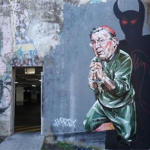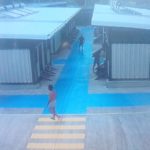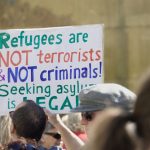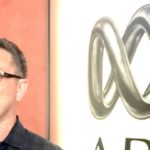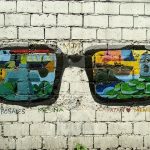Offshore Political Prisoners: An Interview With Social Activist Stephen Langford
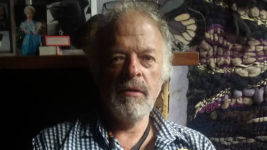
At around 9.15 am on 14th of August 2019, a couple of NSW police officers were sitting at the lights on the corner of New South Head Road and McLachlan Avenue in Darlinghurst, when they observed an individual defacing a billboard.
The officers approached the man, who turned out to be noted social activist Stephen Langford. They informed him he was under arrest for having written, “Sorry to bully innocent people in concentration camps for 6 years. But that’s Australia.”
Mr Langford’s statement referred to the remaining 500-odd asylum seekers and refugees that remain in offshore detention in Nauru and Papua New Guinea, some of whom have been there for up to seven years now. Although, he prefers to describe them as “political prisoners”.
And the long-term activist is rather chuffed at present, as when he appears in court at Sydney’s Downing Centre Local Court on 10 March 2020, he’ll be represented by multi-award winning Australian investigative journalist Mark Davis.
Well worth representing
“I’ve known him for 20 years. He’s thrown his life at East Timor,” remarked Mr Davis. “Including – I’m sure – multiple acts of graffiti bringing to the attention of the Australian public the genocide in Timor.”
“Stephen is one of ten people who deserves a knighthood, if there is such a thing, for those long years,” he added.
Indeed, Langford was awarded the Order of Timor in a ceremony in Timor Leste on 20 May 2015. It recognised his persistent campaigning on behalf of the Timorese people, whose country was illegally occupied by the Indonesian government over the 24 year period ending in 1999.
“So, absolutely, I’ll defend him any day of the week,” Davis the former SBS Dateline co-presenter went on. “And the fact that it’s again for an important issue where lives are at stake, and media and the general public don’t have much interest, I’m very proud to represent him.”
The lawyer made clear that he doubts great harm was done to the billboard, while it’s a bit rich of the company that owns it to try and “gouge” $1,000 out of Langford. But, he’s happy to lend JCDecaux some Windex and a sponge if that will fix the problem.
Forging change
Langford is hardly your regular graffiti tagger, as he was trying to remind the public of the travesty that the Australian government is perpetrating in Pacific Island nations that are much poorer than our own and therefore, willing to take on our responsibilities for a price.
And while he’s at it, Langford likes to draw parallels to the mainstream media silence around the true picture about the offshore detention regime to the lack of discussion about government neglect when it comes to ensuring Julian Assange is returned home.
Sydney Criminal Lawyers spoke to Stephen Langford about why he was compelled to write upon the billboard, the importance of taking action as every bit counts, and the rally that will be held out the front of the Downing Centre Local Court prior to his court appearance.
Firstly, some NSW police officers caught you writing on a billboard on the side of the road in Darlinghurst. Stephen, what actually happened?
I walked past this wretched billboard a hundred times with my dog, and I just couldn’t stand it, knowing what’s happening to the refugees.
It was an advertisement for the latest model Jaguar car. It said, “Sorry, if this seems aggressive.” And it had a front on Jaguar with the lights on.
It looked macho, and all that. And I couldn’t stand it. I’ve done it before. And I think it’s making a good addition to these billboards.
So, with liquid chalk, I wrote, “Sorry, if it seems aggressive to bully innocent people in concentration camps for 6 years. But that’s Australia.”
Then, I turned around and the police were there, which is crazy, because you can wait all day for the police. But, suddenly, they were there immediately. They must have some six sense.
I read in the report that they were sitting at the lights.
Yes. I usually do it at night. But, I did that in the morning for some reason. I think if I wore a hi vis vest it would look like I’m meant to be doing it, and they might take no notice if they saw me.
So, why did you feel compelled to write this on the billboard?
It’s so shocking what’s happening to innocent people. It’s just to get a few racist votes. And there’s not a big push back from Australian society. There are all sorts of immigrant and refugee groups within Australia and they should be pushing back.
It doesn’t take much to change things – not really. The system is predicated on us doing nothing. So, doing something really counts for a lot. Even a pathetic chalk sign.
What we do is much more important than we think, especially when we’re taking action – ideally, collectively. But, even on our own we can do stuff.
You refer to the asylum seekers being held in offshore detention on Nauru and PNG as “political prisoners”. Can you expand on why you use this term?
I actually prefer political hostages, because they’re supposedly being used to stop other people coming by boat. But, this is their legal right under international law: to come and claim asylum by boat or by flight. It doesn’t matter. This is their legal right.
They’re being used as hostages. They’re supposedly being used as deterrents. But, they’re actually being used as scapegoats, as a way of making the overall population feel fear, and dividing people. It’s noxious. And it’s a way of diminishing all of our rights.
This is absolutely shocking. We can’t grasp it, because the mainstream media is just not interested. These are unworthy victims, to use a term that Chomsky borrowed from someone else.
And on the subject of asylum seekers, last week, you attended a rally in Melbourne in support of the Biloela Tamil refugee family who are currently the only detainees on Christmas Island.
This coincided with a Federal Court challenge regarding the refugee claim of the family’s two-year-old Australian born daughter, Tharunicaa.
What’s your opinion on this family having been held in immigration detention since March 2018?
It’s shocking. It’s vindictive. It’s just to show the power. And if we don’t resist it, and we let them be deported, it’s a victory for this power of the state, and people like Dutton putting people in fear. We’ve got to stop this.
They’re the first ones. And then it’s going to be journalists. Then it’s going to be unionists. And then it will be anyone who puts their heads up. It’s a very creeping thing.
Back to your case, you’re actually being represented by veteran Australian investigative journalist Mark Davis. How did that come to pass?
I got hold of the Most Dangerous Man in America, which is about the Pentagon Papers and Daniel Ellsberg in the 1970s. And I thought the people doing the Assange case must know about this. Of course, they’d know about the papers. But, I gave them a ring.
Mark and Mary Kostakidis had done a fantastic Politics in the Pub about the Four Corners program on Assange, which was really a hatchet job. Both of them had a different angle on the reporting of the whole Julian Assange frameup and the role of the mainstream media.
So, I rang Mark and we talked about this. Then I mentioned the graffiti. And he said, “Can I represent you?” It was fabulous.
I was willing to represent myself. I don’t really care about going to prison. Someone has to do something. There’s been a voluntary news blackout on the 500 people being held hostage by the Australian government. It’s been like that for as long as I can remember.
The blackout includes Julian Assange. And to a large extent, it includes Bernard Collaery and Witness K. The media does not get it. And that’s because they’re under the control of Murdoch and vested interests.
I’ve always admired Mark for his stance on East Timor and his work on Dateline on SBS. He’s just a fabulous journalist.
He’s also a friend of Shirley Shackleton, who’s a friend of mine. Her husband was one of the Balibo Five. And she has been an unwavering supporter of justice for the Timorese.
Your court date is set for 10 March at the Downing Centre. There will be a rally out the front that morning in support of your case. What’s that going to entail?
Some statements that have been made will be read out. One is from Noam Chomsky and another is from Eva Cox. Chomsky wrote a lot on East Timor, and he’d sent some statements to me before.
Musician David Rovics will be playing. He’s a genius. He’s a political songwriter. And he’s remarkable. He’s got a great song called Behind These Walls, which he recorded at Belmarsh Prison in London.
And I’ll also be reading out the names of the twelve people who have died so far on Manus and Nauru. They’ve really been killed by the Australian state.
Reza Barati was literally murdered by a guard. We’re all complicit in this.
And lastly, Stephen, you’re a long-term social activist. You said your acts of graffiti are aimed at bringing about change.
So, how should things be changing? What should be happening with these political prisoners, as you’ve referred to them.
They should be resettled here immediately, of course. This should always have been the case. Fuck their racism, or the way the government and the opposition think that they can benefit through people’s fear.
My father was a refugee. Recently, I was sent an article from the Christchurch paper from 1939, saying how my father and his friend were going to be arriving as refugees from Austria. And the local people were collecting money for them.
That’s really how people should be treated if they’re fleeing where they were born and have grown up because of persecution, which was the case with my father.
He was Jewish, but he was a Lutheran. And Lutheran churches became places where the Nazi Party would meet, because it had been banned before the Germans came in.
But, the main thing is that those people in Christchurch were collecting money. And this is diametrically opposed to Australia’s fear campaign.
This was all sorted out after the Second World War in the 1951 Refugee Convention. There’s no mystery.
The ‘51 Convention – which Australia signed in ’54 – is never mentioned, or hardly ever. That’s international law. This is not something we need to make up as we go along.


